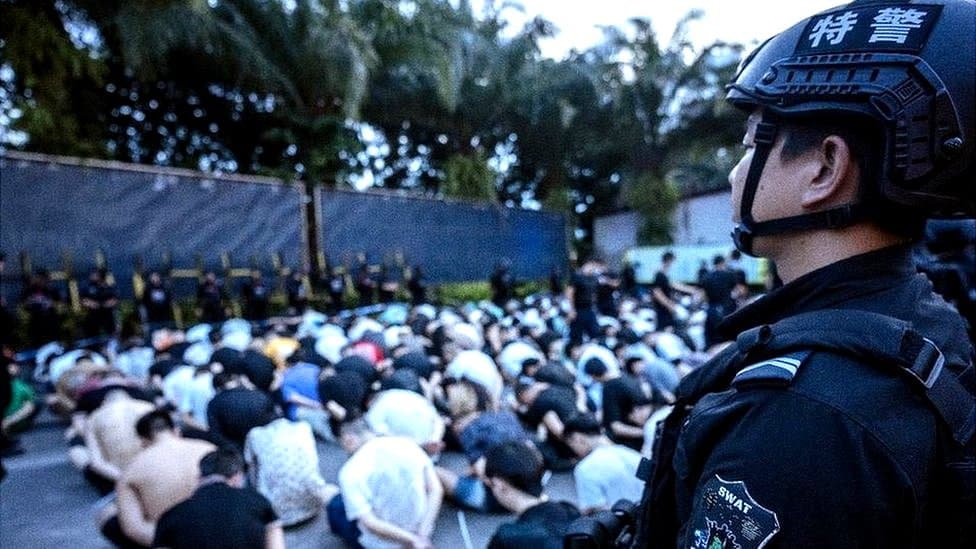We're loading the full news article for you. This includes the article content, images, author information, and related articles.
The Myanmar military has reportedly captured KK Park, a major cyber scam compound near the Thai border, a move that could impact thousands trafficked into forced online fraud, including potential victims from Kenya.

The Myanmar military announced on Monday, October 20, 2025, that it has seized control of KK Park, a notorious cyber scam compound located near Myawaddy, a border town with Thailand. This operation is part of the military's efforts to reclaim territory lost during the ongoing civil war and comes amidst international scrutiny over the proliferation of online fraud operations in the region.
KK Park, situated along the Moei River on the Myanmar-Thailand border, has been identified as a significant hub for cybercrimes, including internet fraud, investment scams, and human trafficking, for the past five years. Thousands of individuals, many lured by false promises of well-paying jobs, were allegedly trafficked to the compound and forced to perpetrate elaborate online scams, defrauding victims globally of billions of dollars.
The establishment of KK Park dates back to a lease agreement in early 2020 between the Karen National Union (KNU), an ethnic insurgent group controlling much of the region, and Huanya International, a Hong Kong-listed company. Researchers have indicated potential links between Huanya International and Wan Kuok-koi, also known as 'Broken Tooth,' a prominent figure in the Chinese underworld and former leader of the Macau 14K Triad. Wan Kuok-koi has been associated with the establishment of other scam centers along the border and was sanctioned by the U.S. in December 2020 under the Global Magnitsky Act for his alleged involvement in drug trafficking, money laundering, and other illicit activities.
The KNU has faced pressure regarding its alleged involvement in KK Park and other illegal activities, with some Karen organizations calling for investigations into KNU leaders. While the KNU denied direct involvement in illegal projects in February 2023, stating it does not tolerate criminal activities, former workers have reported the presence of Myanmar Border Guard Forces soldiers within the complex.
The raid on KK Park occurs as the Myanmar military junta, which seized power in a February 2021 coup, attempts to consolidate control ahead of a planned general election. The first phase of these elections is scheduled to begin on Sunday, December 28, 2025. However, these elections have been widely dismissed as a sham by opposition forces and international observers, who cite the ongoing civil war and the military's control over large parts of the country as undermining their credibility.
International bodies, including the Association of Southeast Asian Nations (ASEAN), the United Nations Office on Drugs and Crime (UNODC), and China, have committed to combating organized crime, human trafficking, and fraud activities in the Golden Triangle region. In August 2022, the Myanmar military junta conducted sweeps targeting internet fraud companies in Myawaddy, and in June 2023, Thai authorities cut off power supply to KK Park and Shwe Kokko due to the Myanmar military junta not renewing the power supply contract.
Victims trafficked to these scam centers, including KK Park, have reported enduring torture, unlawful imprisonment, and threats. A 2024 investigation by Deutsche Welle found that workers at KK Park were subjected to 17-hour workdays, spied on, tortured, and threatened with murder if they attempted to flee. Passports and mobile phones of workers were confiscated to prevent communication with the outside world. The U.S. Department of the Treasury reported that Americans lost an estimated US$10 billion to Southeast Asian scammers in the past year, a 66 percent increase in 12 months.
The global reach of these cyber scam operations poses a significant risk to individuals in Kenya, who could be targeted by elaborate online fraud schemes originating from such hubs. The methods employed, including romance scams and fake investment opportunities, are designed to exploit trust and can lead to substantial financial losses. The involvement of human trafficking also highlights the dangers of deceptive job offers abroad.
Despite the military's claims of capturing KK Park, questions remain about the long-term effectiveness of such operations in dismantling the broader network of cybercrime. An AFP investigation in October 2025 revealed rapid new construction at scam center sites and the installation of Starlink satellite internet devices, suggesting the adaptability of these criminal enterprises. The Myanmar military has long been tainted by its links to the scam business, leading some Karen groups to question whether the raid is a publicity stunt.
Observers will be closely watching for further actions by the Myanmar military to dismantle other scam centers in the region and for any sustained efforts to repatriate trafficked individuals. The credibility and outcome of the upcoming general election in Myanmar will also be a key focus, as will the international community's response to the ongoing civil war and the persistent issue of cybercrime originating from the country.
Keep the conversation in one place—threads here stay linked to the story and in the forums.
Sign in to start a discussion
Start a conversation about this story and keep it linked here.
Other hot threads
E-sports and Gaming Community in Kenya
Active 9 months ago
The Role of Technology in Modern Agriculture (AgriTech)
Active 9 months ago
Popular Recreational Activities Across Counties
Active 9 months ago
Investing in Youth Sports Development Programs
Active 9 months ago